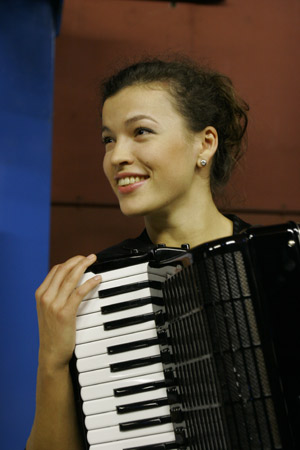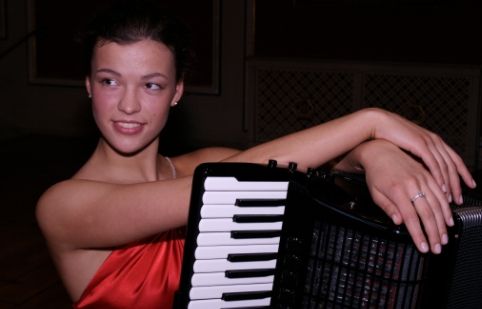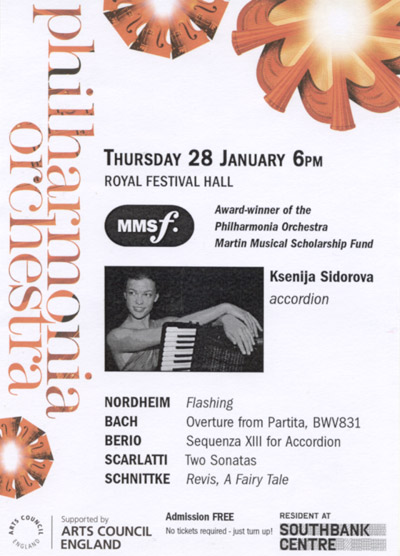A Young Accordionist’s Triumph
|
 Two concerts by the young accordionist Ksenija Sidorova on London’s South Bank in January 2010 have seen her persuade the serious music critics of the quality press, the top brass in the musical establishment, as well as a Royal Festival Hall audience, to take the accordion seriously and to see its real musical potential as a concert instrument. Two concerts by the young accordionist Ksenija Sidorova on London’s South Bank in January 2010 have seen her persuade the serious music critics of the quality press, the top brass in the musical establishment, as well as a Royal Festival Hall audience, to take the accordion seriously and to see its real musical potential as a concert instrument.Her recital on January 11th at the Park Lane Group Young Artists New Year Series at the Purcell Room was singled out by the critics as the high spot of the week-long series of concerts by young artists studying at London colleges and conservatoires. The Times declared that “Ksenija Sidorova will be remembered as one of the real finds of this series which matches new performers with new music, encouraging young musicians to hone their skills on some of the toughest music around.” The Financial Times said that “…Sidorova got her instrument to inhale and exhale like a living creature.”  Commenting on her performance of Edward McGuire’s ‘Prelude No 12 for accordion’, the FT declares it was “material of sufficient depth and substance to match her story telling gifts.  McGuire’s 1993 piece is “…a thoughtful response to the accordion’s expressive potential…” Other reviewers described her performance as the “silver lining” and “…she has the ability to steal a musical heart…she gave a flawless display on her classical accordion playing, most of her chosen pieces from memory…she is an amazingly accomplished artist” and “‘…she breathes with her bellows and is a delight to watch”. McGuire’s 1993 piece is “…a thoughtful response to the accordion’s expressive potential…” Other reviewers described her performance as the “silver lining” and “…she has the ability to steal a musical heart…she gave a flawless display on her classical accordion playing, most of her chosen pieces from memory…she is an amazingly accomplished artist” and “‘…she breathes with her bellows and is a delight to watch”.With such press reviews a fortnight or so before she performed on Thursday evening January 28th to a much larger audience in the Royal Festival Hall, expectations were high and there was obviously pressure. None of it however disturbed her and she gave a flawless performance (all from memory) of big music, ancient and modern. Her Royal Festival Hall programme was not confined to contemporary works for classical accordion but skilfully interspersed them with classical works and in so doing showed the full range of Ksenija’s musical ability. It showed also the intellectual approach of her teacher Owen Murray and her background at the Royal Academy of Music. |
 Her programme began with Arne Nordheim’s ‘Flashing’, based on material from the cadenza in his accordion concerto ‘Spur’. The work, which was beautifully played, exploits the sustaining characteristic of the accordion as a keyboard instrument. Her programme began with Arne Nordheim’s ‘Flashing’, based on material from the cadenza in his accordion concerto ‘Spur’. The work, which was beautifully played, exploits the sustaining characteristic of the accordion as a keyboard instrument. It was in sharp contrast to her next offering of J.S. Bach’s ‘Overture in the French Style’ (BWV 831), from ‘Clavierübung II’, a very big work for two-manual harpsichord. Ksenija gave a splendid performance of this great and virtuosic work. There can, of course, never be a ‘definitive’ or completely ‘authentic’ performance of Bach’s keyboard works no matter on what instrument they are played. The test of a good performance must be whether an artist brings the music convincingly to life, leaving it imprinted in the memory of an active listener. Bach wrote as he says “…for the soul’s delight of music lovers…” The enthusiasm of the audience left no room for doubt about the fulfilment of those tests. Bach was followed by Luciano Berio’s ‘Sequenza XIII for Accordion’, a huge jump in style and approach to music and sound. The sustained legato sound, with intricate filigree passages was brought to life with stunning effectiveness. Berio’s favourite 18th century composer was Scarlatti and his ‘Sequenza’ was followed by two Scarlatti sonatas. Why do Scarlatti’s sonatas in the hands of an artist of Ksenija’s ability sound so right on an accordion? The answer might be that of all composers he is the most sensitive to tonal colour, which a skilled accordion player can provide. There was a further nice balance of programme in the choice of two early sonatas between the slower harmonically intense two-movement K77 in d minor and the ripplingly virtuosic K33 in D major. Fittingly Ksenija completed her programme with four transcription pieces from Alfred Schnittke’s one-act ballet, ‘Sketches’. One can say fittingly because of the nature of Schnittke’s style of combining styles of music across the centuries into one of his own. Ksenija presented his music with humour and skilful aplomb. Owen Murray and his small department at RAM has attracted and developed some wonderful talent currently and over the years. Ksenija Sidorova is a joy to watch and listen to; she projects to her audience a captivating musical intelligence combined with skilful performance. |
Next Concert Wigmore Hall, London Monday 29 March 2010 - 7:30 PM £8 £10 £13 £15 The Monday Platform Performers
ProgrammeAbout this concertTwo young Latvian musicians, both studying at the Royal Academy of Music, share this concert: classical accordionist, Ksenija Sidorova has won several international prizes; pianist Andrejs Osokins, also a prizewinner, was recently awarded the audience prize for his performance of Vitols, a composer whose work he will perform in this concert. The Worshipful Company of Musicians (Reg. Charity) |